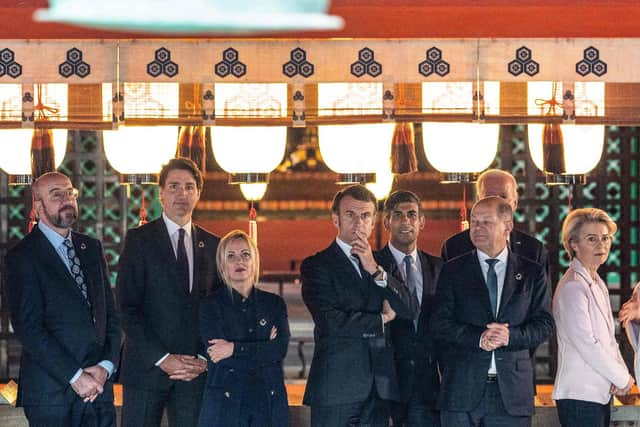G7: Western leaders launch new measures to stop Russia, China holding world economy to ransom
Today the G7 will announce the creation of a “co-ordination platform on economic coercion”, intended to be a mechanism to enact collective retribution on countries which abuse their economic power to impose their will on others.
The platform will employ academics and other experts to monitor the activities of powers including Russia and China, and will co-ordinate the response when they are thought be engaging in economic coercion.
Advertisement
Hide AdAdvertisement
Hide AdExamples include China blocking imports of Australian wine in retribution for calls for an investigation into the origins of Covid-19, and Russia’s use of its near-monopoly on European gas to exploit smaller countries.


Prime Minister Rishi Sunak said: “We should be clear-eyed about the growing challenge we face. China is engaged in a concerted and strategic economic contest. And when Russia weaponised Europe’s energy supplies, it was a sign of what can happen when we rely too much on states who don’t share our values.
“Our collective economic security matters now more than ever. By working together and avoiding competition between friends, we can lift our prosperity, innovate faster and out-compete autocratic states.”
The Prime Minister will on Saturday hold a one-on-one meeting with French president Emmanuel Macron on the sidelines of the G7 summit, before a gala dinner including all the leaders’ spouses.
On Friday, Mr Sunak attended the formal opening of the summit at the Peace Memorial Museum in Hiroshima, built to commemorate the dropping of the atomic bomb on the city in 1945.
Mr Sunak wrote in the guestbook: “Shakespeare tells us to ‘give sorrow words’. Yet language fails in the light of the bomb’s silent flash. No words can describe the horror and suffering of the people of Hiroshima and Nagasaki. But what we can say, with all our hearts, and all our souls, is no more.”
Mr Zelensky is flying to Hiroshima on Sunday where he will address the leaders of Britain, the US, Canada, Japan, France, Germany and Italy.
It comes as inflation and energy bills are set to drop next week in a welcome boost for household finances, and increasing pressure on Jeremy Hunt for an early tax cut.
Advertisement
Hide AdAdvertisement
Hide AdThe Consumer Prices Index, which measures the average increase in the prices of goods and services purchased by many households, is expected to fall significantly from its existing rate of 10.1 per cent on Wednesday.
Economists believe it will fall to about 8 to 8.5 per cent when the Office of National Statistics announces the figure.
The Bank of England‘s forecast is that inflation will hit 8.2 per cent across the second quarter of the year, which starts in April. Lower inflation could spell relief for many mortgage holders, as it may decrease the likelihood of a further interest rate rise next month.
It makes the prospect of the Government lowering taxes more likely as the Treasury will be paying less to service the country’s debt.
Sir Iain Duncan Smith, the former leader of the Conservative party, said he thought improved inflation figures would give the Chancellor more room to cut taxes.
Comments
Want to join the conversation? Please or to comment on this article.